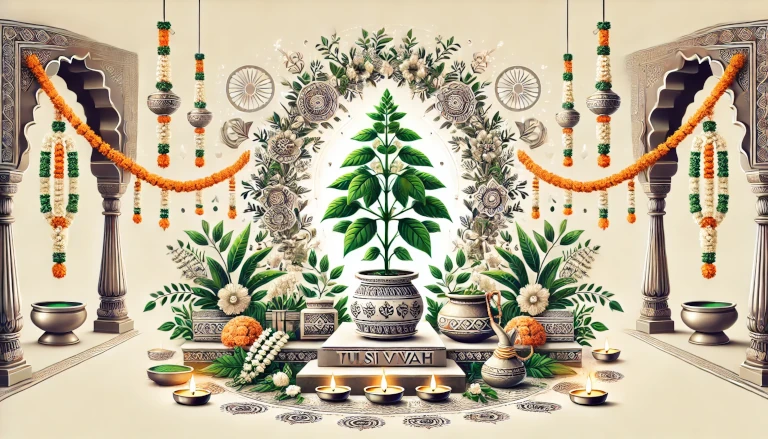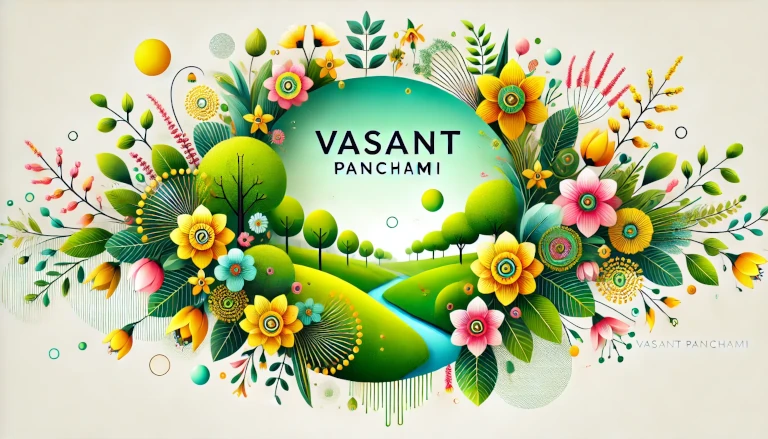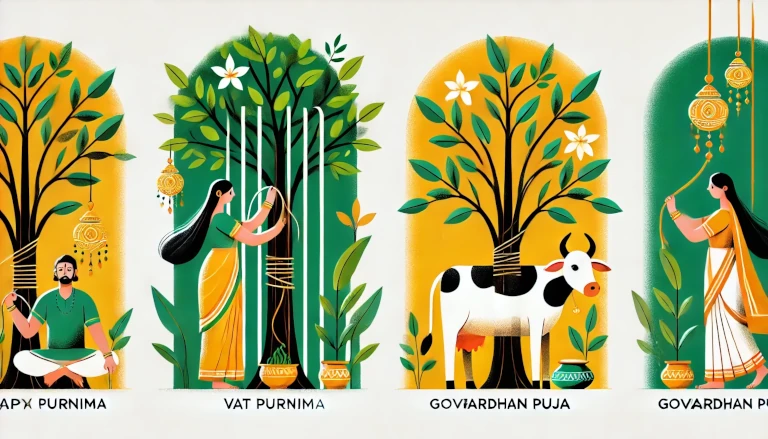Tulsi Vivah is an important Hindu festival that marks the ceremonial marriage of the Tulsi plant (Holy Basil) to Lord Vishnu, in the form of Shaligram. Celebrated mainly in India, this ritual holds both religious and environmental significance. Rooted in ancient wisdom, the practice reflects deep spiritual values and environmental awareness, linking nature and culture. Tulsi Vivah is typically performed during the Hindu month of Kartik (October-November) and symbolizes the end of monsoon and the beginning of the auspicious wedding season.
What is Tulsi Vivah? 🌿💍
Tulsi Vivah is a sacred ritual where the Tulsi plant is ceremonially married to Lord Vishnu or Lord Krishna, represented by Shaligram (a sacred black stone). This marriage is celebrated as part of the Hindu Kartik month and is widely observed across Indian households and temples. Tulsi (Holy Basil) is considered a sacred plant in Hinduism, symbolizing purity and spirituality, while Lord Vishnu is regarded as the preserver of the universe. This symbolic union holds deep spiritual and cultural meanings.
The Sacred Role of Tulsi:
- Tulsi is revered as the earthly manifestation of Goddess Lakshmi, the goddess of wealth, prosperity, and purity.
- Worshipping Tulsi is believed to bring prosperity, health, and peace to the household.
Why is Tulsi Vivah Celebrated? 🌟
The festival of Tulsi Vivah signifies the victory of righteousness and the start of auspicious ceremonies. According to Hindu mythology, Tulsi (incarnate as Goddess Vrinda) was married to the demon Jalandhar, who became invincible due to her chastity. To end his tyranny, Lord Vishnu disguised himself as Jalandhar and broke Vrinda’s chastity, leading to Jalandhar’s defeat. Vrinda, heartbroken, cursed Vishnu to turn into stone (Shaligram). To repent, Lord Vishnu married Vrinda in the form of Tulsi. Thus, Tulsi Vivah celebrates the eternal bond between Tulsi and Vishnu, representing the triumph of good over evil.
How is Tulsi Vivah Performed? 🕉️
The rituals of Tulsi Vivah resemble a traditional Hindu marriage. Here’s how the ceremony is performed:
- Preparation of Tulsi Plant: The Tulsi plant is cleaned and decorated with a sari, jewelry, and garlands, symbolizing the bride.
- Shaligram Decoration: The Shaligram stone, representing Lord Vishnu, is dressed as the groom.
- Ceremonial Wedding: Priests chant Vedic mantras, and the Mangalsutra (sacred thread) is tied to the Tulsi plant. Rice and vermillion are offered, followed by a traditional wedding feast.
The Tulsi Vivah ceremony is observed with great devotion, and devotees believe that participating in it brings good fortune and spiritual blessings.
Where is Tulsi Vivah Celebrated? 🏡
Tulsi Vivah is primarily celebrated in India, with particular fervor in the states of Maharashtra, Gujarat, Uttar Pradesh, and West Bengal. It is also observed in some parts of Nepal and other regions with a significant Hindu population. The festival is performed in temples, public ceremonies, and homes where Tulsi plants are part of the household.
When is Tulsi Vivah Celebrated? 📅
Tulsi Vivah takes place during the Hindu month of Kartik, which falls in October-November. The exact date varies, but it generally occurs on Ekadashi or the 11th day of the waxing moon in Kartik. The timing of Tulsi Vivah coincides with the end of Diwali celebrations and the onset of the wedding season in Hindu culture, marking the beginning of auspicious times for marriages and other significant events.
The Ancient Wisdom of Tulsi Vivah 🌿
The significance of Tulsi Vivah is rooted in ancient Hindu traditions that reflect ecological balance, spiritual purity, and social harmony. Tulsi is considered the “queen of herbs” for its medicinal properties and is widely used in Ayurveda to treat ailments like colds, coughs, and respiratory disorders. The ritual of worshipping Tulsi emphasizes the respect for nature and the environment.
Environmental and Health Benefits of Tulsi 🌿💧
In addition to its religious significance, the Tulsi plant has many health benefits:
- Medicinal Properties: Tulsi is known for its antimicrobial, anti-inflammatory, and antioxidant properties. It helps boost immunity and fights infections.
- Environmental Benefits: Tulsi is a natural air purifier that absorbs toxins and releases oxygen, contributing to better indoor air quality.
Benefits of Celebrating Tulsi Vivah 🌿💍
- Spiritual Growth: Tulsi Vivah fosters spiritual development, encouraging devotion, gratitude, and reverence for nature.
- Environmental Awareness: The festival promotes planting and caring for Tulsi, which benefits the environment and spreads awareness of the importance of conservation.
- Health Benefits: By worshipping Tulsi, individuals are reminded of its medicinal value and encouraged to integrate it into their daily routines for better health.
The Timeless Wisdom of Tulsi Vivah 🌿🕉️
The ancient wisdom behind Tulsi Vivah transcends mere religious practice. It represents a deep connection between spirituality and nature, encouraging individuals to care for their surroundings, foster a sustainable environment, and embrace holistic living. Through Tulsi Vivah, the significance of both human and ecological relationships is celebrated, making it one of the most profound festivals in Hindu culture.
The ancient wisdom behind Tulsi Vivah teaches us the importance of spiritual devotion, environmental care, and the holistic benefits of nature in our daily lives. 🌿
Read this in Marathi at तुळशी विवाह: प्राचीन परंपरा आणि त्यामागील महत्त्व
Discover more from Green Ecosystem - Renewable Energy, Agriculture, and Environmental Sustainability
Subscribe to get the latest posts sent to your email.


